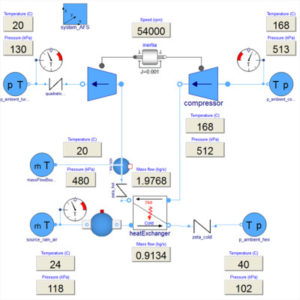Modelon’s Environmental Control Library is a Modelica library for aircraft environmental control systems analysis and design. The library is designed to study energy consumption and thermal conditions that affect the level of comfort for passengers and crew.
These performance aspects are driven by large variations in ambient conditions such as humidity and temperature. The models provided by Environmental Control Library account for these effects through first principles and fully support bidirectional flow.
The library has been developed internally at Modelon for a number of years together with a European airframer, and starting with version 3.1 it is publicly available. Modelon is now able to offer out of the box a library reinforced through industrial collaboration deployment.
The library provides an efficient and numerically robust framework suitable for large-scale complex systems. Component models include heat exchangers, compressors, turbines, ejectors or jet pumps, water separator, valves, cabin and pipes.

Air conditioning performance assessment.
The bleed air from the engine is directed to the primary heat exchanger where it is cooled with ambient ram air. The air is then compressed and cooled down further in the main or secondary heat exchanger. A high pressure water separation loop allows for the extraction of free moisture.
APPLICATION
The Environmental Control Library is being used successfully by industry in system performance assessment and control system design.
The models are used to verify how the resulting system robustly delivers air conditioning and auxiliary cooling to all aircraft thermal loads.
Application Include:
- Design and assessment of bleed and bleedless architectures
- Control system verification
- Full vehicle thermal management
- Verification of critical components – is sufficient moisture extracted in the high pressure water separation loop.
Resources
Modelon Libraries
Related News & Blog
Ready to use Modelon's libraries for powerful system simulation?
Get in touch with us today to see how Modelon’s libraries handle complex modeling and return accurate results.


